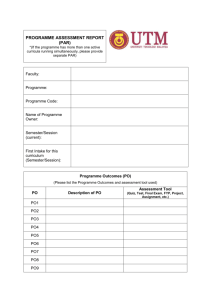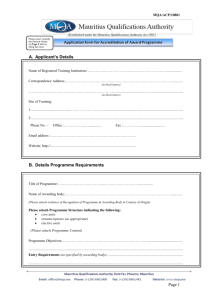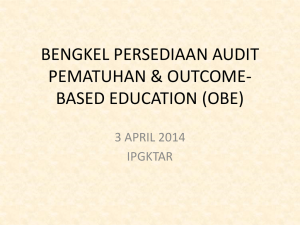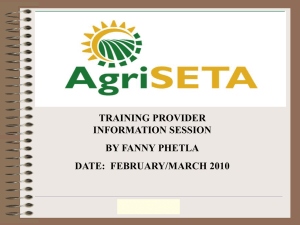mqa education and training quality assurance
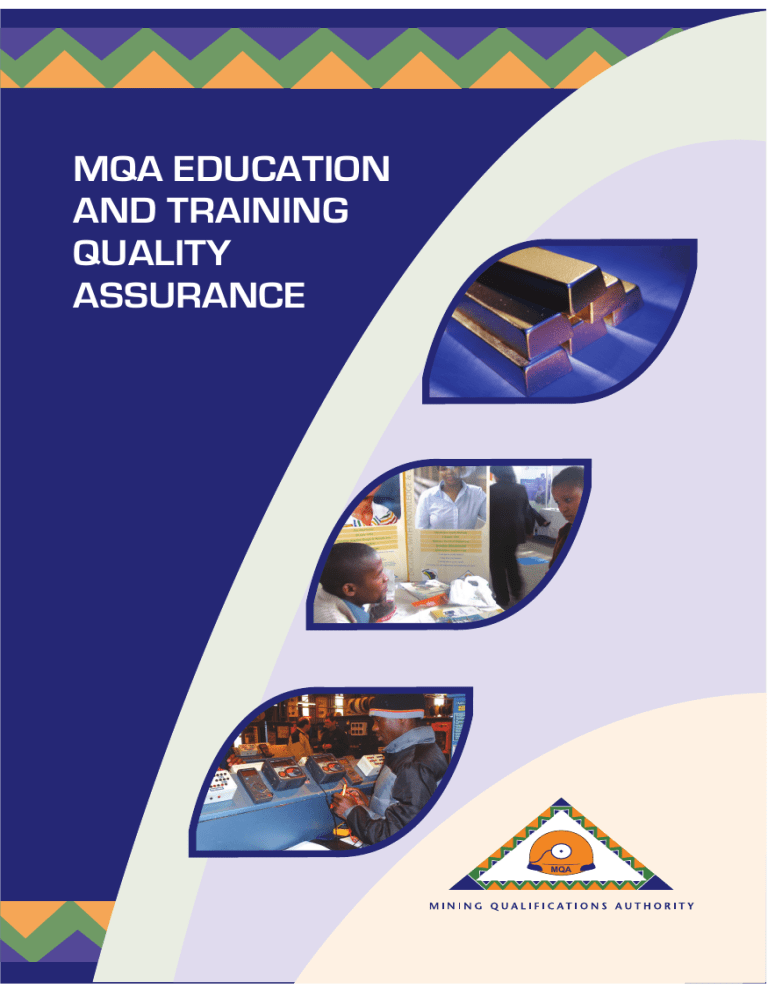
MQA EDUCATION
AND TRAINING
QUALITY
ASSURANCE
MQA
1. Functions
The proviso for the accreditation of Education and Training Quality Assurance (ETQA) bodies was promulgated in 1998, when ETQA regulations were published. Their responsibility included accrediting providers of education and training standards and qualifications, registered on the National Qualifications Framework (NQF), auditing the quality of learning provision and assessment, registering assessors, moderators and issuing valid certificates to learners.
The ETQA also certifies a system that promotes and maintains quality by:
Sector, implement the ISO 9001:2000 Quality Management System together with
other requirements as stated by SAQA.
unit standards.
MQA
Successfully assessing each learner against all the unit standards that make up a
particular qualification and then issuing a qualification certificate against competence
for that learner. This certificate will only be issued for qualifications obtained that have
been registered on the NQF.
Primary Function is ensuring value through:
1. Accrediting training providers for specific standards or qualifications registered on the
NQF;
2. Quality assurance of learner achievements by registered assessors in accordance with
required standards and criteria;
3. Evaluation of learning programmes;
4. Improving the quality and relevance of education and training in the sector;
5. Supporting provider development;
6. Establishing and maintaining a database by recording learner achievements;
7. Certification; and
8. Assessor Registration.
Certification
In terms of the SAQA Act, the MQA is accredited by SAQA to fulfil the functions as contemplated in Regulation 9 of the ETQA Regulations R 1127 of 1998 to, inter alia, conduct the function of certification.
The MQA fulfils this by:
MQA
Issuing certificates to learners who have proved competence against a qualification;
MQA
Issuing statements of attainment to learners who have proved competence against a skills
MQA
programme;
Issuing certificates of accreditation to Training Providers that have met all the requirements to
receive full accreditation status;
Ensuring that the currency of certificates by monitoring the security of certificates.
MQA
Assessor Registration
The registration of assessors forms one part of the quality assurance process designed to ensure the credibility of the assessment system. This function has been devolved to the ETQA’s by SAQA.
The SAQA requirements demands that Assessors are registerd with ETQA.
The purpose of assessment is to measure outcomes. In standards-based assessment, the learner presents evidence to the assessor that he/she has met the outcomes of the unit standards. It is the role of the assessor to judge this evidence and declare competence (when appropriate). The assessor gives feedback to the learner regarding the assessment decision. The assessor will recommend whether additional coaching and or learning and or assessment are needed.
Assessment emphasizes the assessment of outputs and end products, which are expressed as outcomes and competence. The assessment criteria measures applied competence, which consists of Practical, Foundation and Reflexive competence.
This means that the leaner must:
MQA
Be able to perform a set of tasks in an authentic setting;
MQA
Demonstrate understanding of what and why he is doing something;
MQA
Be able to integrate performance with understanding, so as to be able to show that he/she can
adapt to changed circumstances, and then explain the reasons for change.
Why do we need assessors?
The reason for the registration of assessors is to enhance the credibility of assessment decisions, which ultimately impacts on the awarding of unit standards and/or qualifications.
MQA Requirements for the Registration of Constituentt Assessors
In order for one to register as an assessor with the
MQA, one must:
MQA
Must be found competent on the “Plan and condact assessment of learning outcomes” by an
ETDP SETA accredited Training Provider;
MQA
Must be a subject matter except in the field for which one is applying to assess;
MQA
Must be linked to an MQA linked company, and
MQA
Must complete and submit all relevant documents to the MQA.
Quality Assurance Learner Achievements
Accredited providers must ensure that the following deliverables are adhered to prior to the recognition of provider assessments and certification of learners by the MQA:
1.
Learner achievements reflect genuine competence against registered unit standards
and qualifications at the relevant/associated level;
2.
Assessment of achievements are fair, valid and reliable;
3.
Assessments are in line with SAQA policies and procedures, for quality assurance
of learner achievements; and
4.
All assessment systems are in place and operational
Learner achievements are validated to ensure that assessment of learners complies with national standards and qualifications. Such verification processes, are validation mechanisms used to verify recommendations on awards, and to ensure that assessments are accurately conducted and moderated. The quality assurance of learner achievements ends with the endorsement process, whereby the recommendations from the provider in relation to learner achievements are endorsed by the MQA ETQA in terms of its certification process.
Provider Accreditation Requirements
The MQA, acting in its capacity as an ETQA, has a responsibility to maintain quality of assessments throughout the mining industry. One means of doing this is to establish criteria for the accreditation of providers and registration of assessors. In terms of the SAQA ETQA Regulation 1127 of 1998, the MQA must also audit quality of providers, moderate assessment and review qualifications and unit standards for the mining industry.
MQA
Assessments System;
Moderation System;
MQA
MQA
Learning Delivery System;
QMS (ISO 900:2000)
MQA
Applicants as training providers can fall into one of three categories:
MQA
MQA
Provides only education and training services;
Provides only assessment services;
Provides the full spectrum of education, training and assessment services.
MQA
All providers may be accredited by the MQA ETQA, provided that the body seeking accreditation:
1.
is registered as a provider in terms of the applicable legislation at the time of
application for accreditation
2.
has a recognised quality management system (ISO 9001:2000) which includes but
is not limited to:
• quality management policies, which define that which the provider wishes to achieve
• quality management procedures, which enable the provider to practise its defined
quality management policies, or
• review mechanisms, which ensure that the quality management policies and
procedures defined are applied and remain effective;
4.
5.
3.
has the ability to achieve the desired outcomes, using available resources and procedures considered by the ETQA to be required to develop, deliver and evaluate
learning programmes, which culminate in specified registered standards or qualifications; has the necessary financial, administrative and physical resources; has the policies and practices for staff selection, appraisal and development;
6.
8.
has the policies and practices for learner entry, guidance and support systems;
7.
has the policies and practices for the management of off-site practical or work-site
components; has the policies and practices for the management of assessment which include appeals systems;
9.
has the necessary reporting procedures;
10.
has a declaration of suitability of a workplace (Provider and/or Employer) for training
and/or assessment;
11.
has not already been granted accreditation by or applied for accreditation to another
ETQA.
Accreditation will only be granted if the MQA is satisfied that all the criteria for accreditation have been met. Upon receiving accreditation, each provider will be issued a certificate by the MQA. This certificate shall state that the organisation’s accreditation number and the scope which the provider is accredited to deliver.
MQA Supports Provider Development by:
1.
Continuously disseminating information on quality assurance practices and issues to
providers, other ETQA’s, and relevant stakeholders in the industry;
2.
Aligning providers’ quality management systems with ISO 9001 2000 requirements;
3.
Building capacity in relation to good practice assessment, moderation and Recognition
of Prior Learning (RPL);
4.
Making available opportunities to participate in programmes that support emerging
providers, concentrating on the small, medium and micro providers and previously
disadvantaged providers;
5.
6.
Promoting an accessible and informative website;
Raising awareness and promoting debate around quality assurance issues and practices.
Accreditation Process
Step 1:
Step 2:
Step 3:
Step 4:
Step 5:
Step 6:
Step 7:
The applicant accesses the application documentation via the MQA
Website (www.mqa.org.za) or from the MQA ETQA Department. A letter of intent has to be submitted to the MQA ETQA Department.
MQA ETQA Department conducts an information session with the applicant
Applicant submits the application with the supporting documentation to the ETQA department at the MQA Office
The MQA ETQA Unit acknowledges receipt of the application
The MQA ETQA Unit carries out a desk evaluation on the submission and arranges an pre audit visit
The MQA ETQA Unit arrange for an accreditation audit visit
The ETQA Sub Committee recommends the accreditation/rejection to the ETQA Committee
The MQA accredits the applicant as a training provider
The MQA ETQA committee ratifies the accreditation of the applicant
Step 8:
Step 9:
Step 10:
Step 11:
The MQA ETQA Department issues a letter and certificate of accreditation to the applicant via the department
In situations of a denial/rejection of accreditation, the MQA ETQA
Unit sets a date with all parties to discuss the outcome with the applicant guided by the MQA ETQA appeals process
Note: Accreditation Application Forms and Guidelines are available at the MQA ETQA Unit and on the MQA website.
Programme Evaluation
Programme Evaluation leads to the award of standards and qualifications that fall within the MQA’s primary focus. Learning programmes that meet specified criteria will be declared fit for purpose and approved.
Who should apply for programme evaluation?
1.
Training providers as part of their accreditation application;
2.
3.
Accredited providers, for extension of accreditation to new programmes;
Providers within the primary focus of other ETQA’s with programmes that fall under
the MQA ETQA focus, these providers should apply via their primary ETQA’s.
The MQA ETQA functions on Programme evaluation:
1.
Programmes must culminate in credits against the achievement of registered unit
standards and qualifications;
2.
The curriculum (both design & content) must be appropriate to the standards and
qualification;
3.
Learners must have access to learner support assessment methods and tools must meet requirements for the unit standard or qualification;
4.
Practitioners, assessors and moderators must have the necessary expertise.
The MQA ETQA Provider code of conduct:
MQA
Prospective providers of Education and Training, accredited by the MQA ETQA, must take note of the MQA ETQA.
MQA
MQA
Provider Code of Conduct.
The same applies to the MQA ETQA Provider accreditation guidelines available from the ETQA department at head office.
The contents of this brochure are for general information and illustrative purposes only and are not intended to serve as financial or any other type of advice. The MQA makes no representation as to the accuracy of the information on this document. Reliance on any information on this brochure shall be at the user's own discretion. For more updated information, please contact the MQA.
MQA
PRIVATE BAG X118
MARSHALLTOWN, 2107
TEL: (011) 630-3500
FAX: (011) 832 1027
Email: qualityassurance@mqa.org.za
4th Floor UNION CORPORATION BUILDING
74 - 78 MARSHALL ST
MARSHALLTOWN,
JOHANNESBURG
